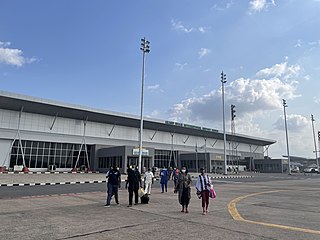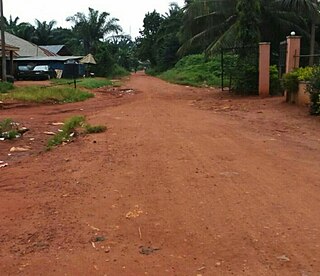
Nsukka is a town and a Local Government Area in Enugu State, Nigeria. Nsukka shares a common border as a town with Edem, Opi, Ede-Oballa, and Obimo.

The University of Nigeria, commonly referred to as UNN, is a federal university located in Nsukka, Enugu State, Eastern part of Nigeria. Founded in 1955 by Nnamdi Azikiwe who was the Governor General of Nigeria between 1960 and 1963, and first President of Nigeria between 1963 and 1966. The University of Nigeria Nsukka was formally opened on 7 October 1960. The University of Nigeria has three campuses in Enugu State–Nsukka, Enugu, and Ituku-Ozalla – and the Aba campus in Abia State.

Enugu State is a state in the South-East geopolitical zone of Nigeria, bordered to the north by the states of Benue and Kogi, Ebonyi State to the east and southeast, Abia State to the south, and Anambra State to the west. The state takes its name from its capital and largest city, Enugu. The city acquired township status in 1917 and was called Enugwu-Ngwo. Due to the rapid expansion towards areas owned by other indigenous communities, it was renamed Enugu in 1928.

Akanu Ibiam International Airport, also known as Enugu Airport, is an airport serving Enugu, the capital city of Enugu State of Nigeria, and nearby cities, such as Abakaliki, Awka, Onitsha, Nnewi, Afikpo, Okigwe, Nsukka, Ugep, Orlu, Idah, Otukpo and Ogoja. The airport is named after the late Akanu Ibiam (1906–1995), a medical doctor and statesman who hailed from Afikpo in Ebonyi State.
Awo-Idemili is the headquarters of Orsu Local Government, Imo State in southeastern Nigeria. It is located near the city of Orlu.
Ede-Obala is a suburban area of Nsukka located south of the main town. Ede-Obala is made up of three autonomous communities, Ede-Ukwu, Ede-Nta and Owerre Ede-Obala with their traditional rulers. Each of the communities has villages and each of the villages is headed by a village head known as Onyishi. Ede-Obala is located in Nsukka local government area. The town is bounded by Opi, Eha-alumona, Lejja and Nru Nsukka.
Ohum,, is a valley town in Enugu State, in southeastern Nigeria.
Ihiagwa is a town in Owerri West Local Government Area of Imo State, Nigeria. It is located 12 km (7.5 mi) south of the capital city of Owerri. The township is composed of eight villages: Umuelem, Umuchima, Mboke, Nnkaramochie, Iriamogu, Aku/Umuokwo, Ibuzo and Umuezeawula. Ihiagwa has been divided into two autonomous communities, namely Ihiagwa Ancient Kingdom (Chimelem), comprising two villages: Umuelem and Umuchima;and Dindi-Ihiagwa, comprising the remaining six villages, all divisions done for administrative and developmental reasons. Each autonomous community is a monarchy ruled by an Eze.
Udenu is a Local Government Area of Enugu State, Nigeria. Its headquarters are in the town of Obollo-Afor on the A3 highway.
Edem, occasionally referred to by the misnomer "Edem Ani" to distinguish it from Edem Nru and Edem Iheakpu Awka, is an ancient traditional state in Nsukka Local Government Area of Enugu State, Nigeria. A culturally rich, stable traditional political system with institutions of government dating back 900 years, it is one of the oldest civilisations in existence pre-colonial Nigeria. Today, it is made up of three autonomous communities/towns, listed in order of seniority: Akpa-Edem, Ozi-Edem and Edem-Ani but unified as a culturally inviolable and indivisible federated entity.
Ogui is an autonomous community in Nike, in Enugu North Local Government Area of Enugu State in the southeastern geopolitical zone of Nigeria. It comprises Umunevo Village, Ihewuzi Village and Onuato Village. Ogui Nike, as it is usually called, is a major landlord to the administrative, political and economic hub of Enugu City, in that major public and private institutions, shopping malls, hotels, banks and so on are situated on Ogui land.
Amakohia-Ubi is an autonomous community in the Owerri West Local Government area of Imo State (1), Nigeria. The community is divided into four villages: Umunjam, Obiọkwu, Umuike, and Umuọka. Each of these villages, which later became towns, has between four and eight kindreds. Amakọhia-Ubi, originally, Amakọhia-Ubi was a village in the Umunwọha Ọfọ Ise community comprising Ohii, Amakohia-Ubi, Ndegwu, Orogwe, and Irete in order of seniority, until each of them was recognized as autonomous by the Peoples Democratic Party-led government. Each of these officially known as an autonomous community was granted the right to choose a traditional ruler according to government procedures establishing the autonomous community status.
Unadu is a community in Igbo Eze South Local Government Area of Enugu State, Nigeria. It lies North West of Nsukka. Boundaries are formed by (Akpanya) Kogi state To the North, Enugu-Ezike, Itchi and Alor-Agu. Unadu plays host to Afor Market, popularly known as Afor Unadu and situated at the central area of the community. Unadu is made up of two autonomous communities: Ohomu Unadu and Obaka Unadu. Each of the autonomous communities is ruled by a traditional chief called the Igwe.
Lejja is a community comprising 33 villages in Enugu State of South-Eastern Nigeria. It is populated by the Igbo people and located about 14 Kilometers from Nsukka. It is the location of a prehistoric archaeological site which contains iron smelting furnaces and slag that dates back to 2000 BC. The village square at Otobo ugwu which is likely the first village square in Lejja that contains over 800 blocks of slag with an average weight, between 34 and 57 kg. Geophysical investigations have located buried iron slag in several other locations in the community.
Opi is a community in Enugu State of southeastern Nigeria. It is populated by the Igbo people and located in Nsukka region. It is the location of a prehistoric archaeological site which contains iron smelting furnaces and slag dated to 750 BC. Iron ore was smelted in natural draft furnaces and molten slag was drained through shallow conduits to collecting pits forming huge slag blocks weighing up to 47 kg. The operating temperatures are estimated to have varied between 1,155 and 1,450 °C.
The Waawa clan of Northern Igboland, also referred to as Ndi Waawa, Wawa People, are a unique sub-group of the Igbo people in Enugu and Ebonyi State, Nigeria, consisting of several communities, who all speak a unique dialect of Igbo called Waawa. The most notable among these are the Agbaja and Ngwo which consist of peoples between the wooded lands of Awka to the rocky valleys of Enugu. The Agbaja are made up of communities in present-day Ngwo clan, Udi, Ezeagu, Umulokpa, Igbo-Etiti, Oji River, greater Awgu, Odume, Ndiagbor, Nenwe, Mpu, Okpanku and Enugu East Local Government Areas. Other notable parts of the Waawa clan include Nkanu, Nsukka, Abia, Nike, Agbani, Owo, and other communities in Enugu State. The Waawa are most notably associated with Chief Onyeama's people from Eke, who was the paramount ruler of Agbaja in the early 20th century.
Iheagu, Nru Nsukka is the oldest sub communities in Nru Nsukka. It's the birthplace of people like Late Sen. Fidelis Okoro, Egbugo Charles Onumonu and Sylvanus Arumah. Nru Nsukka has traditionally three major communities namely Iheagu Nru, Ezema Nru, Edem Nru and finally Umuoyo. Late Sen. Okoro hails from Iheagu, Nru Nsukka.
Nru Nsukka is a suburb located in Nsukka town. Nru Nsukka is one of the former old three autonomous communities: Mkpunanor, Nru and Ihe n'Owerre that made up the Nsukka urban area. Nru Nsukka having been upgraded to a suburban area was split into three newer autonomous communities with newly installed traditional rulers. Since 2018, the suburb is now made up of Iheagu Nru autonomous community with its traditional ruler as Sylvanus Arumah, Ezema ne Edem autonomous community with its traditional ruler as Linus.O. Atugwu and the youngest being Umuoyo Nru autonomous community with Paul Atanike as its traditional ruler elect.

Ezema is one of four sub-communities that made up Nru Nsukka town in Nsukka Local Government Area, Nigeria. It is adjacent to the three other sub-communities in Nru Nsukka: Edem Nru, Umuoyo Nru and Iheagu. It also shares common boundaries with Various communities such as Umuoyo, Iheagu, Agbamere/Amike and Umabor both in Eha Alumona.




